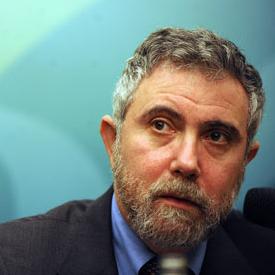Krugman's Not So Green Economy
 Paul Krugman's scheme to cut emissions through cap-and-trade would fail to create the investment needed to sustain a carbon-free economy.
Paul Krugman's scheme to cut emissions through cap-and-trade would fail to create the investment needed to sustain a carbon-free economy.
Princeton economist turned fire-breathing lefty political pundit Paul Krugman recently wrote a much discussed piece in The New York Times Magazine titled “Building a Green Economy.” Krugman’s thesis is that implementing a cap and trade system for carbon dioxide emissions combined with a “big bang” transition away from certain “bad” activities is a national and global imperative.
Although my employer spends a lot of time on the subject, I don’t work on climate issues myself. Other people better qualified than me have offered withering critiques of the cost and effects of the proposals Krugman favors. What interests me about the article, however, is that it correlates the idea of a “green economy” with government policies aimed solely or mostly at reducing carbon dioxide emissions. Even if reducing those emissions is important—and certainly, some environmentalists who I consider friends think they are—it seems to me awfully unlikely that fighting global warming ranks among the best ways to build a “green” nation.
Many of the key goals that everyone agrees are “green” have little relation to carbon dioxide emissions. Some examples that I’m familiar with from my own work on coastal insurance are Army Corps of Engineers water projects, development subsidies, property insurance price controls, zoning codes that put development above all else, and national flood insurance. All of these policies have, for most of the past century, encouraged development on environmentally sensitive wetlands and coastal areas. This destroys wildlife habitat, turns otherwise beautiful areas into anonymous shopping malls, and increases the amount of property damage resulting from floods and hurricanes.
Actual environmental improvements good for humans, animals and the environment as a whole would require cutting funding for destructive water projects, restoring wetlands to their natural states, ending implicit subsidies to develop wetlands, and working to preserve more open space. A truly green economy would take these things into account. The same thinking can apply to many other issues. Controlling carbon dioxide emissions, by itself, won’t preserve an inch of wilderness, clean a single body of water, or save a single endangered species.
Controlling carbon dioxide emissions would, by Krugman’s own calculations, be very expensive. Commentators such as Bjorn Lomberg have demonstrated that we can protect the planet and human health much more cost effectively by pursuing policies other than trying to forestall or prevent global warming.
Even if one accepts the most extreme forecasts of man-made global warming proponents, cap and trade schemes aren’t likely to spur the sort of investment and scientific discovery needed to produce a carbon-free economy. Europe, after all, already has cap and trade in place and no great, green breakthroughs have resulted. (Emissions also apparently haven’t fallen.) Wouldn’t a better plan be to offer ample, broad incentives for new investment such as the wholesale elimination of the capital gains tax?
Krugman’s prescription for a “green” economy appears decidedly lacking. Whatever his ideas might amount to, they certainly won’t create a “green” economy or save the environment. There are other, better ways to accomplish “green” goals.